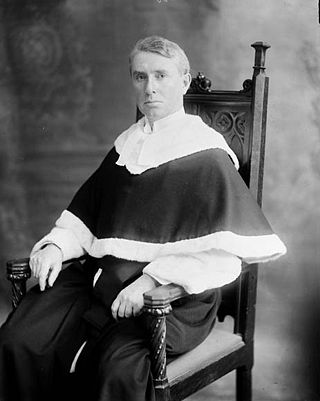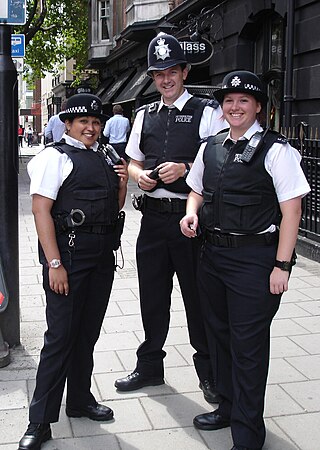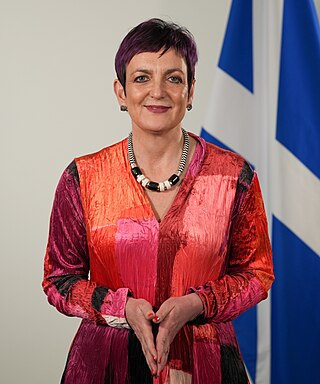Related Research Articles

The Regulation of Investigatory Powers Act 2000 is an Act of the Parliament of the United Kingdom, regulating the powers of public bodies to carry out surveillance and investigation, and covering the interception of communications. It was introduced by the Tony Blair Labour government ostensibly to take account of technological change such as the growth of the Internet and strong encryption.

Closed-circuit television (CCTV), also known as video surveillance, is the use of closed-circuit television cameras to transmit a signal to a specific place on a limited set of monitors. It differs from broadcast television in that the signal is not openly transmitted, though it may employ point-to-point, point-to-multipoint (P2MP), or mesh wired or wireless links. Even though almost all video cameras fit this definition, the term is most often applied to those used for surveillance in areas that require additional security or ongoing monitoring.
A sheriff is a government official, with varying duties, existing in some countries with historical ties to England where the office originated. There is an analogous, although independently developed, office in Iceland, the sýslumaður, which is commonly translated to English as sheriff.

The Home Office (HO), also known as the Home Department, is a ministerial department of the Government of the United Kingdom. It is responsible for immigration, security, and law and order. As such, it is responsible for policing in England and Wales, fire and rescue services in England, Border Force, visas and immigration, and the Security Service (MI5). It is also in charge of government policy on security-related issues such as drugs, counterterrorism, and immigration. It was formerly responsible for His Majesty's Prison Service and the National Probation Service, but these have been transferred to the Ministry of Justice.

A justice of the peace (JP) is a judicial officer of a lower court, elected or appointed by means of a commission to keep the peace. In past centuries the term commissioner of the peace was often used with the same meaning. Depending on the jurisdiction, such justices dispense summary justice or merely deal with local administrative applications in common law jurisdictions. Justices of the peace are appointed or elected from the citizens of the jurisdiction in which they serve, and are usually not required to have any formal legal education in order to qualify for the office. Some jurisdictions have varying forms of training for JPs.

The term magistrate is used in a variety of systems of governments and laws to refer to a civilian officer who administers the law. In ancient Rome, a magistratus was one of the highest ranking government officers, and possessed both judicial and executive powers. In other parts of the world, such as China, magistrate is a word applied to a person responsible for administration over a particular geographic area. Today, in some jurisdictions, a magistrate is a judicial officer who hears cases in a lower court, and typically deals with more minor or preliminary matters. In other jurisdictions, magistrates are typically trained volunteers appointed to deal with criminal and civil matters in their local areas.

Law enforcement in the United Kingdom is organised separately in each of the legal systems of the United Kingdom: England and Wales, Scotland, and Northern Ireland. Most law enforcement duties are carried out by police constables of a territorial police force.

A facial recognition system is a technology potentially capable of matching a human face from a digital image or a video frame against a database of faces. Such a system is typically employed to authenticate users through ID verification services, and works by pinpointing and measuring facial features from a given image.

South Wales Police is one of the four territorial police forces in Wales. It is headquartered in Bridgend.
Personal data, also known as personal information or personally identifiable information (PII), is any information related to an identifiable person.

The Cabinet Secretary for Justice and Home Affairs, commonly referred to as the Justice Secretary, is a position in the Scottish Government Cabinet. The Cabinet Secretary has overall responsibility for law and order in Scotland. The current Cabinet Secretary for Justice is Angela Constance, who was appointed in March 2023.

The Competition Bureau is the independent law enforcement agency in charge of regulating competition in Canada, responsible for ensuring that markets operate in a competitive manner.
Big Brother Watch is a non-party British civil liberties and privacy campaigning organisation. It was launched in 2009 by founding director Alex Deane to campaign against state surveillance and threats to civil liberties. It was founded by Matthew Elliott. Since January 2018, Silkie Carlo is the Director.

The Protection of Freedoms Act 2012 is an Act of the Parliament of the United Kingdom. As the Protection of Freedoms Bill, it was introduced in February 2011, by the Home Secretary, Theresa May. The bill was sponsored by the Home Office. On Tuesday, 1 May 2012, the Protection of Freedoms Bill completed its passage through Parliament and received royal assent.

The use of electronic surveillance by the United Kingdom grew from the development of signal intelligence and pioneering code breaking during World War II. In the post-war period, the Government Communications Headquarters (GCHQ) was formed and participated in programmes such as the Five Eyes collaboration of English-speaking nations. This focused on intercepting electronic communications, with substantial increases in surveillance capabilities over time. A series of media reports in 2013 revealed bulk collection and surveillance capabilities, including collection and sharing collaborations between GCHQ and the United States' National Security Agency. These were commonly described by the media and civil liberties groups as mass surveillance. Similar capabilities exist in other countries, including western European countries.

Mass surveillance in the People's Republic of China (PRC) is the network of monitoring systems used by the Chinese central government to monitor Chinese citizens. It is primarily conducted through the government, although corporate surveillance in connection with the Chinese government has been reported to occur. China monitors its citizens through Internet surveillance, camera surveillance, and through other digital technologies. It has become increasingly widespread and grown in sophistication under General Secretary of the Chinese Communist Party (CCP) Xi Jinping's administration.
The Telecommunications (Interception and Access) Amendment (Data Retention) Act 2015(Cth) is an Act of the Parliament of Australia that amends the Telecommunications (Interception and Access) Act 1979 (original Act) and the Telecommunications Act 1997 to introduce a statutory obligation for Australian telecommunication service providers (TSPs) to retain, for a period of two years, particular types of telecommunications data (metadata) and introduces certain reforms to the regimes applying to the access of stored communications and telecommunications data under the original Act.

The Investigatory Powers Act 2016 is an Act of the Parliament of the United Kingdom which received royal assent on 29 November 2016. Its different parts came into force on various dates from 30 December 2016. The Act comprehensively sets out and in limited respects expands the electronic surveillance powers of the British intelligence agencies and police. It also claims to improve the safeguards on the exercise of those powers.
The Biometrics and Surveillance Camera Commissioner is an independent advisor to the UK government created under the Protection of Freedoms Act 2012. Their role is to review the use and retention of biometrics by police, and to encourage compliance with the surveillance camera code of practice. The Biometrics and Surveillance Camera Commissioner is an independent monitoring body of the Home Office.
Clearview AI, Inc. is an American facial recognition company, providing software primarily to law enforcement and other government agencies. The company's algorithm matches faces to a database of more than 20 billion images collected from the Internet, including social media applications. Founded by Hoan Ton-That and Richard Schwartz, the company maintained a low profile until late 2019, until its usage by law enforcement was first reported.
References
- ↑ Scottish Biometrics Commissioner (2022). Code of Practice (PDF) (Report) (0.4 ed.). Scottish Biometrics Commissioner. Retrieved 15 July 2024.
Except for the excluded and reserved functions as previously highlighted in this Code of Practice, it should be noted that the laws in Scotland governing the acquisition, retention, use and destruction of biometric data for criminal justice and policing purposes are different from other UK jurisdictions
- ↑ Scottish Legal News (16 February 2023). "Lib Dems call for expansion of biometrics commissioner role". Scottish Legal News. Scottish Legal News Ltd. Retrieved 15 July 2024.
The Scottish Liberal Democrats have called for the role of the biometrics commissioner to be expanded to include all forms of biometric data such as the use of facial recognition technology used in schools, shops, supermarkets and other public places.